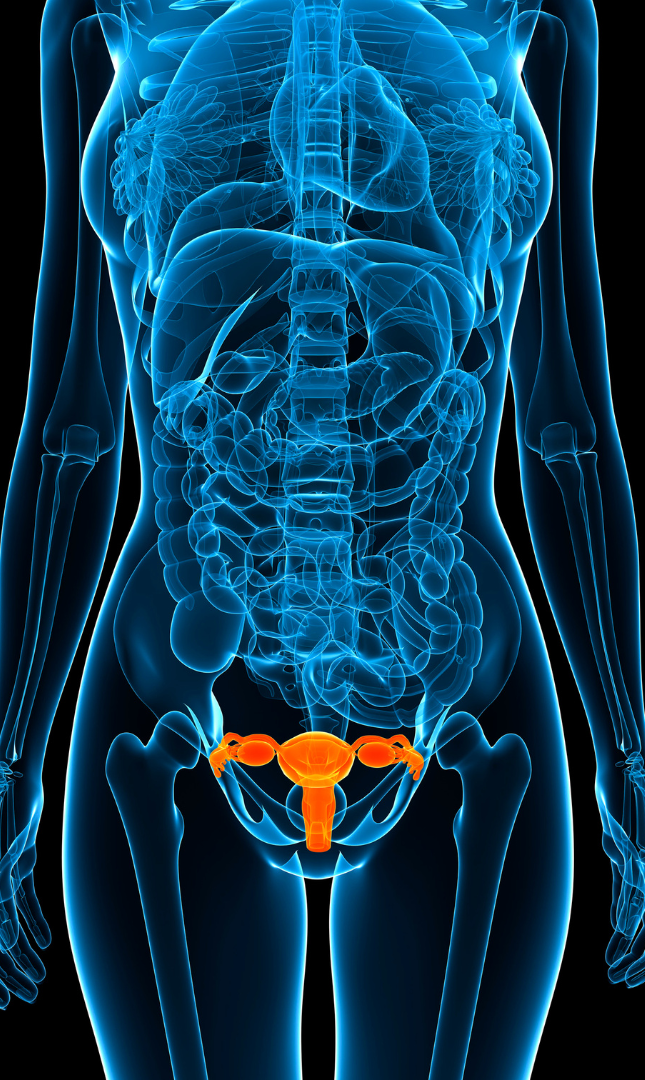Essential Oil Support for the Female Reproductive System and Hormonal Balance
The female reproductive cycle is a complex dance of changes in the uterus, ovaries, breasts, and hormones. Numerous mechanisms, metabolic pathways, and enzymes play crucial roles in regulating the levels of reproductive hormones in the blood. The conversation related to essential oil and female hormonal balance is a complicated one. The main hormones often discussed are the estrogens, progesterone, and testosterone. There are other important hormones that affect female wellness, including adrenaline, cortisol, insulin, melatonin and oxytocin. All of the many hormones require balance and harmony within the body.
Hormones
Hormones are the musical notes composing the intricate melody of the human body.
Hormones are messenger molecules, created within glands and other organs. When released, they bind to cell receptors and communicate with cells by delivering messages. This message tells the cell how to react or what activity to produce. Hormones have specific function, though for some, the functions may vary.
Hormone-like action of essential oils
Essential oils are often said to have hormone-like or neurotransmitter-like activity. They bind and, possibly, communicate with cells similar to the body’s messenger molecules. Receptors on cells are like a lock and the essential oil, like a hormone, is the key. If the “key” fits, the message is received by the cell, triggering its response or action. According to updated research, the essential oils may bind, but may not send a signal or create activity within the cell.
Essential oils in relation to hormone activity is often misunderstood. While essential oils are not hormones themselves, they have been suggested to support hormonal balance by modulating cellular responses.
Essential oils for female reproductive issues
A 2020 study by Sakhteman et al., sheds light on the promising role of essential oil constituents in addressing women's hormonal health and reproductive system. In this study many essential oil compounds were found to have receptor binding activity with receptors crucial for hormonal balance. The study provided many examples. What isn’t completely clear, is the function of the binding essential oil molecule. Essential oils are often said to mimic hormone activity, though this is not a well documented activity of essential oils. Sakhteman concludes his study by stating: “This study did not give investigated possible agonist or antagonist effects of these ligands.”
Clary sage and the phytoestrogen sclareol
The essential oil of clary sage (Salvia sclarea) has long been noted as ideal for the balance of many female reproductive issues such as PMS, cramping, mood swings and menopausal discomfort. Clary sage contains a phytoestrogen, an estrogen-like compound derived from plants. The phytoestrogen is able to bind to the estrogen receptor and has been long noted as the reason clary sage is able to alleviate many complications to the female cycle. It is also contraindicated during pregnancy, and conditions of excess estrogen.
Clary Sage secretory glands - ©Microscopix photo-library
An article written by Robert Tisserand in 2010 explains the lack of evidence that clary sage and sclareol are estrogenic. The hormonal balancing properties of clary sage also lacks evidence. This doesn’t mean that clary sage is not good for hormonal balance or its symptoms. It just means that its properties aren’t due to estrogenic activity. Robert Tisserand also dismissed the idea that lavender is estrogenic saying it is “not a ‘hormone disruptor’, and cannot cause breast growth in young boys (or girls of any age).”
What makes clary sage work?
If you look at the chemical structure of clary sage you’ll find the answer. Like lavender and ylang ylang, clary sage has a high amount of linalyl acetate and linalool. These two compounds are extremely beneficial to reduce:
pain
spasms
tension
stress levels
mood swings
Lavender and clary sage are often used for stress reduction, fight or flight response and nervous tension. They resolve these conditions, partially, through the activity of linalyl acetate and linalool. There are many other compounds known to reduce stress and tension. The choices are also vast to reduce muscle spasms and cramps. We shouldn’t relate the properties of essential oils only to individual molecules. The action of essential oils is a synergistic response to the whole oil’s chemical composition.
Vitex and menopause
The essential oil, Vitex agnus castus (chaste tree), was researched by Barbara Lucks (2002) with encouraging results in reducing symptoms of menopause.
The study concluded that vitex had these benefits:
Decrease or elimination of hot flashes and night sweats
Improved emotional stability and cognitive ability
Improved vaginal tone and lubrication. More comfortable intercourse.
Moderation of irregular periods and flooding
Vitex was also used successfully to assist in regulating the menstrual cycle, and relieving breast pain and symptoms of PMS. The actual physiological activity or the compounds responsible have not been fully identified.
Balancing hormones and relieving hormonally related conditions
No doubt, hormone imbalance, especially in women, can be quite disruptive. Rather than looking to essential oils to produce hormone-like effects, use essential oils to bring whole body balance. Especially by regulating the stress response. This is an area well supported through clinical use and evidence-based studies.
Why the hormonal imbalance?
Too often, statements of skin sensitivity or acneic outbreaks will be blamed on hormones. Accurate, but why the hormonal imbalance?
Various factors may contribute, such as:
Endocrine disrupters - compounds found in preservatives, pesticides and plastics
Diet - foods can influence hormonal balance; foods with added hormones (like meats and dairy) and processed foods
Obesity - it’s known that obesity causes several health and emotional imbalances
Stress - along with the “fight or flight” response, stress may be the most hormonally disruptive
Formulating for hormonal conditions
When considering essential oils for hormone balance, first resolve or identify the many conditions that can cause hormonal imbalance. Your analysis will become the focus of your essential oil choices.
Lowering stress-related fight or flight responses can be highly beneficial. This is an over-active sympathetic nervous response that compromises breathing, causes hypertension and disrupts healthy digestion. Using essential oils shown to raise the parasympathetic function (“rest and digest”) brings the body into a stable, relaxed, and healthy homeostatic state. Start by incorporating essential oils commonly used to address hormonal imbalance symptoms:
Clary Sage (Salvia sclarea)
Lavender (Lavandula angustifolia)
Geranium (Pelargonium graveolens)
Cape chamomile (Eriocephalus punctulatus) or Roman chamomile (Anthemis nobilis)
There are so many essential oils that can be effective in reducing hormonal related symptoms.
Other beneficial oils would include:
Virginia Cedarwood (Juniperus virginiana) - raises parasympathetic activity (reducing fight or flight); anti-inflammatory
Hinoki Wood (Chamaecyparis obtusa); - raises parasympathetic activity: anti-inflammatory
Ylang Ylang (Cananga odorata) - Relieves stress and nervous tension; antispasmodic (reduce cramping), anti-inflammatory
Spearmint (Mentha spicata) - pain relief, antispasmodic
Rose (Rosa damascena) - a do-all essential oil valued for regulating all conditions of the female cycle.
Formulate for the client, not the symptom
There are so many essential oils that can be effective in reducing hormonal related symptoms. The essential oils mentioned in this article may have direct hormonal balancing activity. Because the evidence is weak, it would be better to focus on related issues like stress, environmental conditions and immunity. Choose your essential oils for the person, not just the symptoms. Essential oils are amazing and adapt to the needs of the person. The more you know about your oils the more effective your choices will be.
Feminine Spirit Blend
Download this formula developed to address many of the conditions related to female reproductive balance.
Try JH Feminine Vitality - a captivating blend of nature's most female inspiring essential oils.








